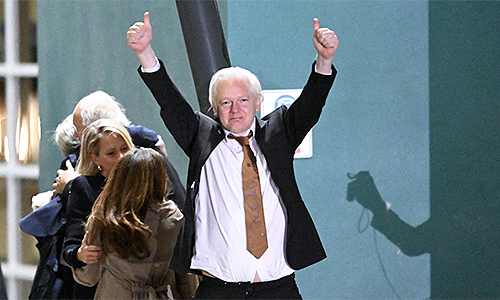Credit: Gage Skidmore/Flicker
Kash Patel, a former federal prosecutor and adviser to former President Donald Trump, has asserted that Congress has the authority to arrest and detain U.S. Attorney General Merrick Garland for refusing to comply with a subpoena.
Patel’s statement stems from Garland’s refusal to turn over embarrassing audio recordings of Joe Biden’s classified documents interview with Special Counsel Robert Hur, which were subpoenaed by Congress.
Last week, the House of Representatives voted to hold Merrick Garland in criminal contempt of Congress for defying a subpoena.
Two GOP-led House committees passed resolutions in May recommending US Attorney General Merrick Garland be held in contempt of Congress for refusing to hand over audio of Biden’s interview with Hur.
Merrick Garland has reportedly “classified at the highest level” the audio tapes of Joe Biden’s embarrassing interview with Special Counsel Hur. The tapes have been locked away in a Sensitive Compartmented Information Facility (SCIF), according to investigative journalist Paul Sperry.
The White House previously admitted in federal court to altering the transcript of Joe Biden’s testimony with Special Counsel Robert Hur.
The edits were made to artificially inflate Biden’s competence during his five-hour interrogation about his mishandling of stolen classified documents.
Biden has personally invoked Executive Privilege against The Heritage Foundation and Judicial Watch in an attempt to keep his controversial interview with Special Counsel Hur under wraps.
DOJ’s Office of Legal Counsel (OLC) asserted that no administration official has ever faced prosecution for non-compliance with a subpoena when the president has invoked executive privilege. Except if your name is Peter Navarro, Steve Bannon, or any other Republican.
The memo, obtained by The Hill, states, “For nearly seven decades and across presidential administrations of both parties, the Executive Branch has taken the position that the criminal contempt of Congress statute… does not apply to Executive Branch officials who do not comply with a congressional subpoena based on a presidential assertion of executive privilege.”
“Consistent with this longstanding position, no U.S. Attorney has pursued criminal contempt charges against an Executive Branch official asserting the President’s claim of executive privilege,” the memo added.
House Oversight Chairman James Comer previously argued that Joe Biden cannot assert executive privilege over the audio of his interview with Robert Hur because the transcript has already been publicly released.
Following the House’s decision on contempt charges, the Justice Department said they won’t prosecute Merrick Garland.
In a letter to House Speaker Mike Johnson on Friday, the department said, “The department has determined that the responses by Attorney General Garland to the subpoenas issued by the committees did not constitute a crime, and accordingly the department will not bring the congressional contempt citation before a grand jury or take any other action to prosecute the Attorney General.”
Patel, who served as chief of staff to Acting Defense Secretary Christopher Miller during the Trump administration, said that the House of Representatives, under its statutory authority, can instruct the Sergeant-at-Arms to arrest Garland and hold him in detention until he complies with the subpoena, according to Just the News.
“Merrick Garland said, ‘No, I’m not going to comply [with the subpoena]. I’m going to break the law,’” Patel said on the Just the News show.
“Then Congress under that authority granted to them by statute can have the sergeant at arms go and arrest Merrick Garland, and can hold him in detention until he complies, just like DOJ would do to anyone else who violates a subpoena,” he added.
According to House rules:
To supplement this inherent power, Congress in 1857 adopted an alternative statutory contempt procedure. Sec. 2, infra. Thus, the House may either (1) certify a recalcitrant witness to the appropriate United States Attorney for possible indictment under this statute or (2) exercise its inherent power to commit for contempt by detaining the witness in the custody of the Sergeant-at-Arms. Manual Sec. 296. The statutory procedure is the one used in modern practice, but the “inherent power” remains available. In one instance, the House invoked both procedures against a witness. 3 Hinds Sec. 1672.
In contrast, the Senate may invoke its civil contempt statute (2 USC Sec. 288d) to direct the Senate legal counsel to bring an action in Federal court.
This inherent power has not been exercised in a century, according to Lawfare Media.
The Gateway Pundit previously reported that GOP Rep. Anna Paulina Luna said she will bring force an inherent contempt vote to the House floor after the DOJ declined to prosecute US Attorney General Merrick Garland.
“The DOJ is not above the law. Garland is not above the law. Inherent contempt will be called up and brought to the floor,” Anna Paulina Luna said.
The DOJ is not above the law.
Garland is not above the law.
Inherent contempt will be called up and brought to the floor. https://t.co/6s0yCFKlBP
— Anna Paulina Luna (@realannapaulina) June 14, 2024
“I already filed the resolution and I will be calling up the vote,” Rep. Anna Paulina Luna said.
— Anna Paulina Luna (@realannapaulina) June 14, 2024
The post Ex-Trump Adviser Kash Patel Asserts House Has Authority to Arrest and Detain AG Garland for Subpoena Noncompliance appeared first on The Gateway Pundit.










